A Survivor’s Story
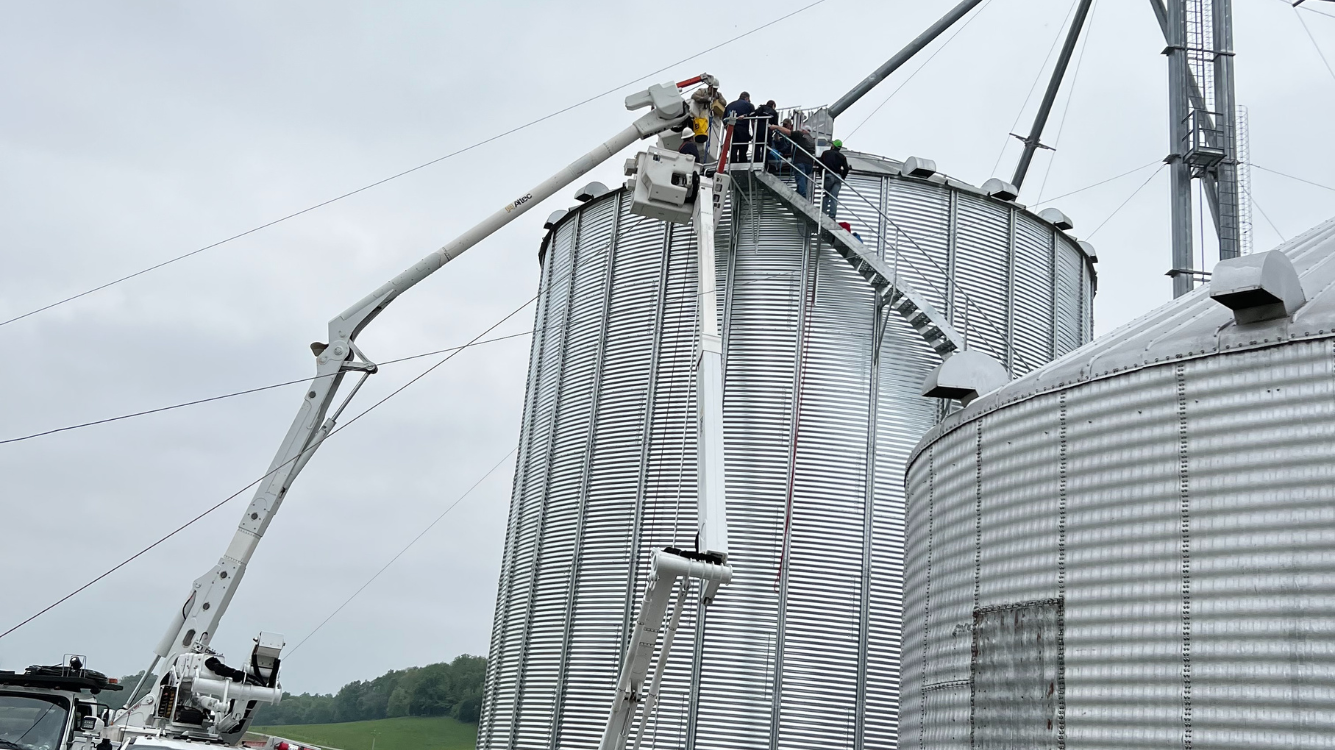
Grain Bin Survivor Shares His Story So It Doesn’t Become Yours
Six hours, 18 minutes.
That’s how long Doug Omer of Morganfield, Kentucky, was trapped inside a 75,000 bushel grain bin May 4, 2022 before he lived to tell the tale. While not an easy story to share, Doug has been telling it to anyone who will listen for the last two years.
He doesn’t want what happened to him to happen to you. He’s got a beautiful wife, three children and four grandchildren to live for. He knows you do, too.
A Typical Day
It was a day that started out as most do for the full-time farmer, who says he started in the profession as soon as he graduated out of diapers.
“We run corn, soybeans and beef cattle,” he said while pausing his work on a late afternoon summer day spent working on a combine. “I’m the fourth generation on this farm; I don’t really know anything else.”
During busy seasons, 90-hour weeks are not uncommon on the family farm. Saving time is a priority. May 4 was a busy day for Doug and his dad, Mike, as they were hauling corn to fulfill a contract.
“When bins change temperature, you know how they get a little scum on top of them? Well, we had a little scum,” Doug explained. “We had quite a bit of grain in there and I thought that little chunk is gonna go down in there and choke my hose up and I’m gonna have a booger bear getting those holes unchoked — so I got this bright idea I’d go in there with a piece of inch and a quarter PVC pipe — 20 foot long — and I’d just knock the crap out of it.”
Solving these kinds of problems was common. Everything usually works out just fine.
Usually. Not that day.
“Everything was going textbook, then I hear this shhhhhhhhh — you know a hissing or a water moving sound? I thought, ‘what in the crap is that?’ I turned around and here comes this slide. I was to the top of my boots in the corn. When it hit me, it took me just about to my pockets on my blue jeans and moved me 20 feet right over the hole,” Omer said.
It was a corn avalanche. His dad, outside the bin loading grain, was unaware.
“One of the most important things I did was, our bin had four doors in the bottom of it and for some reason I closed all the doors except the outside one next to the wall. It saved my life. When the grain hit me, it took me to the wall instead of taking me to the center. It was kind of a freak accident,” Omer explained. “I really don’t know why I did it the way I did do it.”
Close enough to the walls, Omer had something to hit with that pipeand be heard.
“It got to my belly button and I’m making noise. I’ve got a PVC pipe and I can touch the walls. I am that close. I’m beating on the walls. I’m screaming you gotta stop, you gotta stop and I just kept going down.”
The corn crept up to the middle of his ribs.
“Me and Jesus had a pretty good talk right then. I thought, ‘this is it. This is how your country ass is going to die, in this freaking corn bin.’ I was still going down, so I got my arms up in front of me and I’m beating the walls with every piece of my being. I’m busting my arms open on the walls, I splintered the PVC pipe. My dad was hearing me. He thought a bucket was coming off the legs. He was inside looking, the wall was tearing up and I was making noise.”
It got up to the top of Omer’s shoulders and he laid his head back into the corn.
“I had this bright idea I was going to stick the PVC pipe in my mouth to breathe. That was a really dumb idea because that wouldn’t work, but I would have made a deal with the devil to get out of that spot I was in.”
Eventually, his dad figured out what was going on and stopped. While not a young man, his dad proved he was still spry, sprinting up 61 steps in a matter of seconds. He yelled to his son, concerned he wasn’t going to make it and wanted to go in and help.
“I said you can’t come in. If you come in, you’ll bury me,” Omer said.
Instead, his dad went to the house to get Omer’s nephew, Logan. A college student, he lives on the farm. They tied him off and sent him in the bin with an aluminum scoop shovel.
He was able to dig Omer out, before burying him a second time and burying himself for a time.
While cell service is spotty out by their bins, Omer’s dad was calling 911, asking for help. While they waited, Logan called Doug’s wife, Samantha, and put her on speaker.
“I told her, I’m hung in a bin, it doesn’t look very good. If I don’t make it, you tell the grandkids I love them, you tell the kids I love them and I love you.”
A determined woman who loves her family, Samantha wasted no time driving to the farm, even beating the fire department, using her flower van to let the fire department know where to stop. Dale Pierce was a stranger when he entered the bin, hanging from ropes above Omer. Since then, the two have become friends. Pierce is fire chief at Whispering Pines Fire Department.
“When Dale got there, they sent five of those plastic boards down — you know the kind they fish you out of the ditch with when you have a car wreck? They were put in front of me like surfboards,” he said. “I had five people around me. Their walking around me was killing me. I didn’t have a whole lot of feeling. From my neck down I was pretty much confused, but I could tell by the way I was trying to breathe when they were walking around me it was getting tighter, tighter and tighter.”
His mom, who lives about 300 yards from the shop, happened to have a bunch of plastic bakery trays. If the emergency responders stood on those, it didn’t hurt so much when they walked around. Crews called the grocery stores in the area, and they threw what they had in the parking lots while first responders gathered them. Folks knew what was going on and everyone wanted to help.
There were multiple fire departments responding. Farmers were showing up from all over. Hundreds of people flocked to be at the farm to be there if needed. So many folks were on the spiral staircase going up the bin, it couldn’t support the weight.
The vibration of the bin caused another avalanche, so the crews limited access to the stairs. A buddy, who works for the power company, saw word of the incident on Facebook and brought out boom trucks for easier, safer access.
“I had no feeling. I was hurting, but I was kind of numb,” Omer recalled
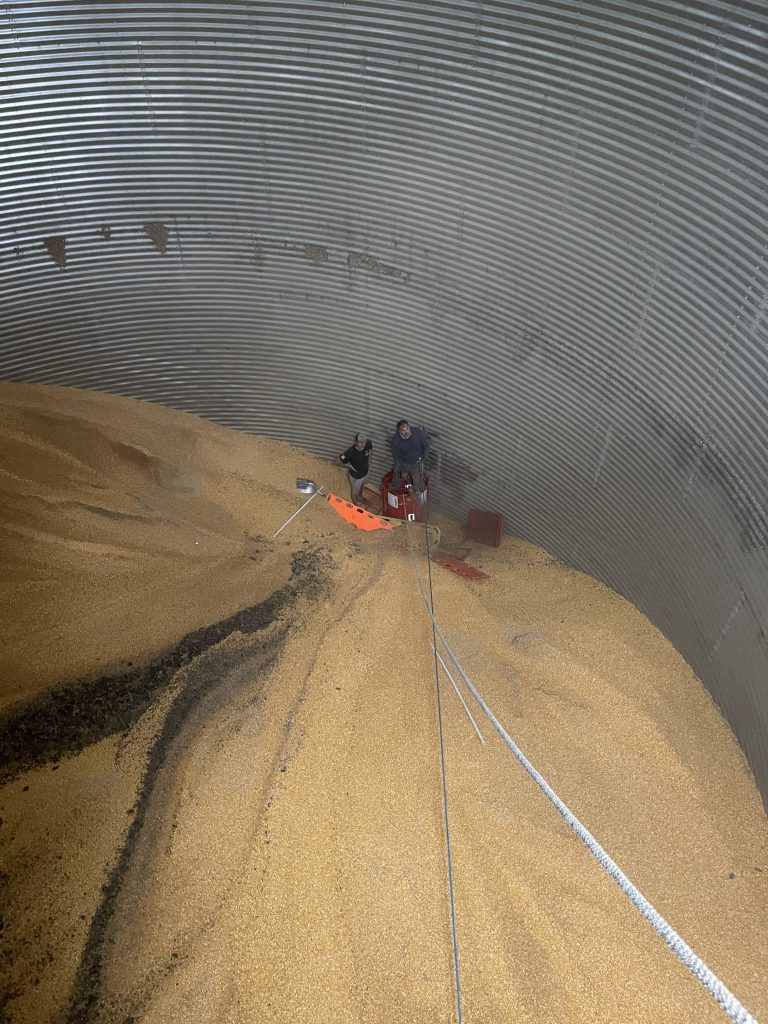
In the course of those six hours and 18 minutes, Omer would be buried, recovered and buried again. His oxygen went dangerously low. He was supplied with oxygen and fluids and had blood draws while in the corn.
His hips and knees would become dislocated. At one point, Omer was begging for a saw so he could cut his legs off. In his oxygen-deprived, panicked state, he thought it was his only way out.
“I thought, big boy you ain’t gonna make it. Nothing is going to get you out,” Omer said.
First responders didn’t comply with his request and, eventually, Omer was able to walk down those 61 steps under his own power, with all his limbs.
Omer was quickly brought to the helicopter for a journey to the hospital. As blood began to come out of his ears, his eyes and his nose, they realized Omer was experiencing what’s known as the ‘bends’ something usually only deep-sea divers experience. It’s caused by the rapid decrease in the pressure that surrounds you. The helicopter dropped from 2,000 feet and flew as low as possible to bring him to the hospital. There, his limbs were re-dislocated and placed correctly, among other treatments.
He walked out of that hospital before midnight. It has been more than two years since that fateful night.
Omer’s long-term injuries were minimal. He describes muscle issues and bruises from every stitch in his Levi’s jeans. He had a few rough months and his legs aren’t quite the same as they were before. Still, he’s able to live his life and do his work.
Omer continues to count his blessings and works to keep others safe.
Counting the Numbers
GEAPS Member Butch Hendrix spent some of the first days of September at a campsite with loved ones. The vacation didn’t keep him from counting grain entrapments. When he talked to him, he had just heard about the 32nd tragedy of the year.
A couple days later, we were up to 34. These things keep happening. That’s why Omer wanted to share his story with you.
In his day job, Hendrix works as safety director at Kokomo Grain in Kokomo, Indiana — but that’s not his only title. He’s a firefighter, a police officer and an EMT. If you’ve been to GEAPS Exchange, he’s the familiar face you see each year working at the Grain Entrapment Rescue Demo on the expo floor. Hendrix gives all his time, in one way or another, to keeping folks in our industry safe.
“I’ve been tracking entrapments since 2021,” Hendrix said. “I try to see what I can help with, the whole totality of it. Thankfully, rescues are becoming more and more common. These things used to have a fatality rate of 70 to 90 percent. We’re in the 50 percent range this year. Things are looking a lot better.”
In the United States, there are usually 30 to 35 entrapments each year, Hendrix said.
In his work, Hendrix has met many rescue professionals from all over the country. They form a network of sorts, keeping each other up on new techniques, sharing positive stories about rescues.
Stories like Doug’s motivate Hendrix and others, because it shows the training he and others do is working. Less people are going into bins. When they must enter, safety measures are in place. When folks become entrapped, emergency responders are better equipped to celebrate a rescue, instead of mourning a recovery.
“When we get the rescues, it really brightens your day. It makes you feel like you’re doing something,” Hendrix said.
One of the many names in Hendrix’ rescue network is Dale Dobson. Dobson is safety director for the Kentucky Department of Agriculture.
It’s his job to protect one of Kentucky’s most valuable commodities: the folks working in agriculture.
A Coincidence or a Miracle?
Entrapment rescue training is something that is shared. Dobson trained the responders who trained the folks who would rescue Omer.
Little did they know, in just one week they would be using these newfound skills at Omer Farms.
“His was a difficult rescue at first, but the boys didn’t give up, they did not quit,” Dobson said.
Over the years, there have been many rescues and many recoveries in Dobson’s career. Survivors usually don’t show up when he’s giving presentations.
As you’ve surmised by now, Doug Omer’s story isn’t typical.
Sharing Gratitude, Giving Thanks
If you met Doug Omer, you wouldn’t see him as a victim. Chances are, you’d think he was a hard worker and a nice guy. You’d probably be able to tell he’s a Kentucky farmer. His accent and love of all things John Deere will give that much away.
Ask him, and he’ll tell you he’s a man on a mission.
“I rung up a debt that day I’ll never be able to pay off,” Omer said. “I had never been in a situation where I couldn’t help myself before.”
It took a lot of people to save his life.
In all, there were six fire departments responding. There were about 250 first responders
including police and emergency medical technicians. There were neighboring farmers who came by with any equipment they thought might be needed, such as semis and skid steers.
Omer laments he doesn’t know who they all were. He’s on a mission to thank them all. He tells stories of people coming up to him in the grocery store, letting him know they were there that day, or a family member was there.
“About a month after, the fire chief from Sturgis called me up and said they were going to have a round table discussion, would you come?”
The chief wanted to talk about what went right and what went wrong. Omer refused to say a bad word and instead threw the first responders and their families a party at the fairgrounds.
“Because of them I am alive; I’m not going to say anything wrong,” he said.
His wife, Samantha, is a caterer and they prepared a feast with pork chops and all the fixings and desserts. His dad bought a pallet of watermelon. His mom made buckets of homemade ice cream.
“It was a way for my family to say thank you and I got to see some of those people,” he said. “The guys who were in that bin with me wouldn’t leave me.”
That party was just the start of Omer’s gratitude journey.
Sharing his Story
When Omer heard there was going to be a grain bin safety training event nearby, he gathered up his 10-year-old grandson and went to check it out.
“The first time I ever met him, I knew who he was, but I hadn’t met him,” Dobson said. “I was getting ready to do a slide program in Davis County. This guy walks in and tells me who he is. He says I’m the one who got saved a couple months ago.”
Omer ended up speaking that day, and many days since at Kentucky Agriculture safety events.
“I consider him a good friend and a good farmer. A lot of people get saved and they take for granted first responders and rescuers for what they do. Doug has not. He cooked them supper. Our volunteers and responders are what save our communities — and they get taken for granted. Doug recognizes that. He gives credit where credit is due to everyone out there working that day,” Dobson said.
Protect Your Story
If you’re reading this story, chances are you work around grain bins. Omer doesn’t want his story to become yours.
“Don’t get in a hurry. Think about the worst-case scenario. Have someone there with you. Be tied off,” Omer warned. “I would never do it again — but if I hadn’t got caught, I’d still be doing it.”
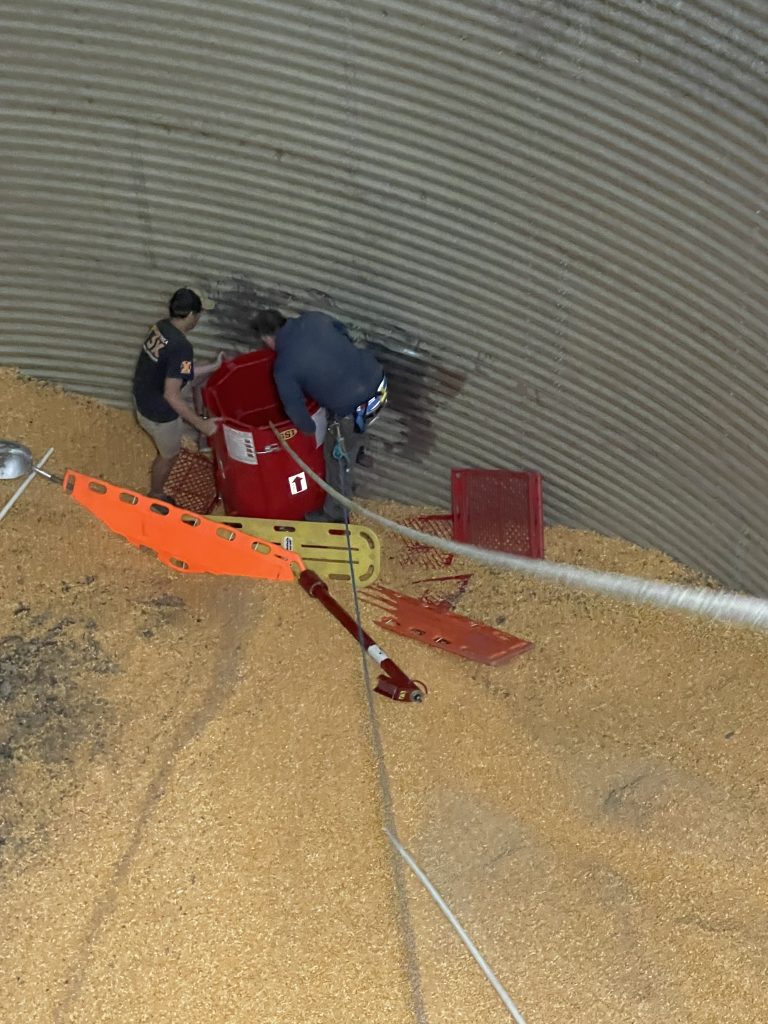
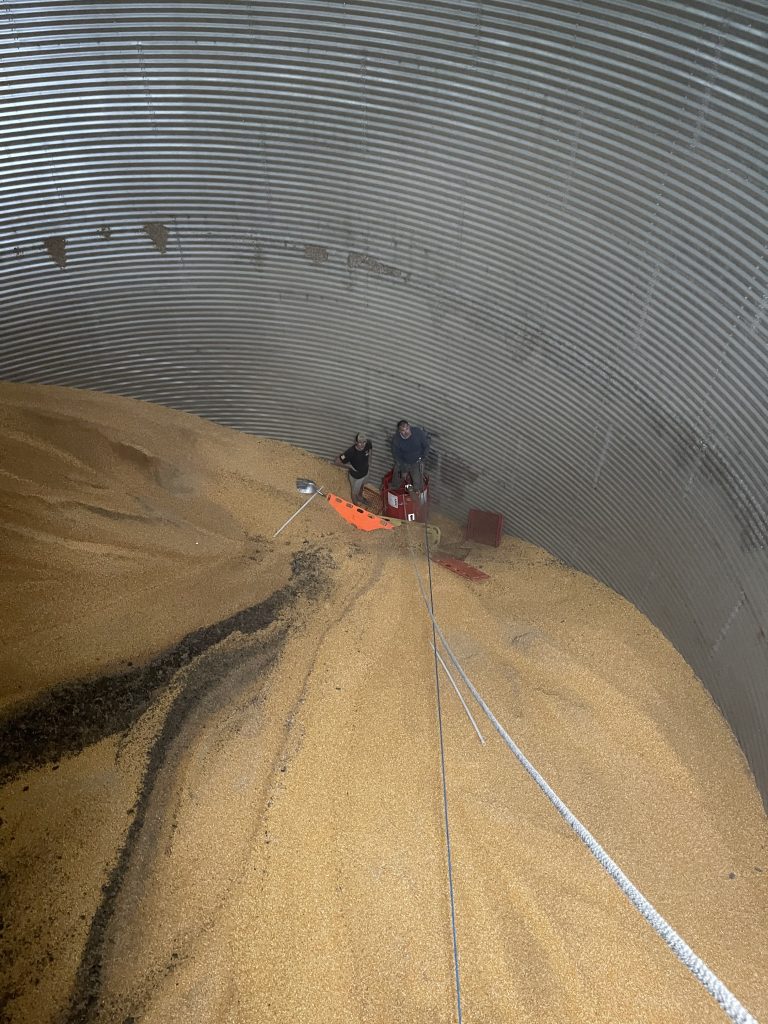
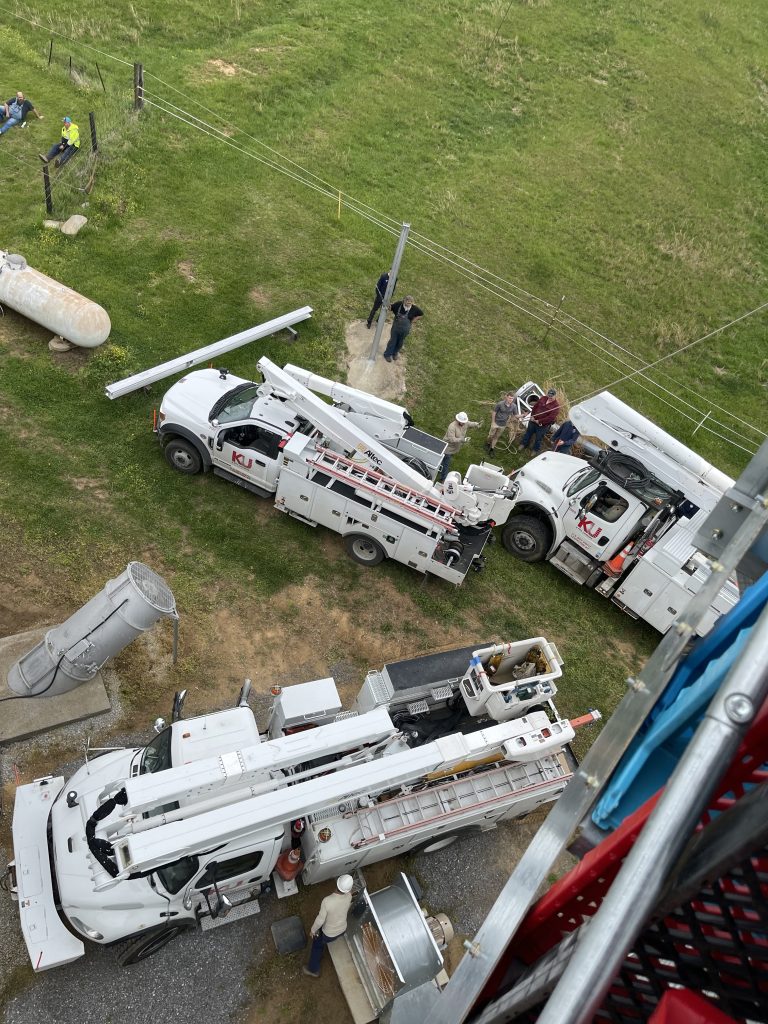
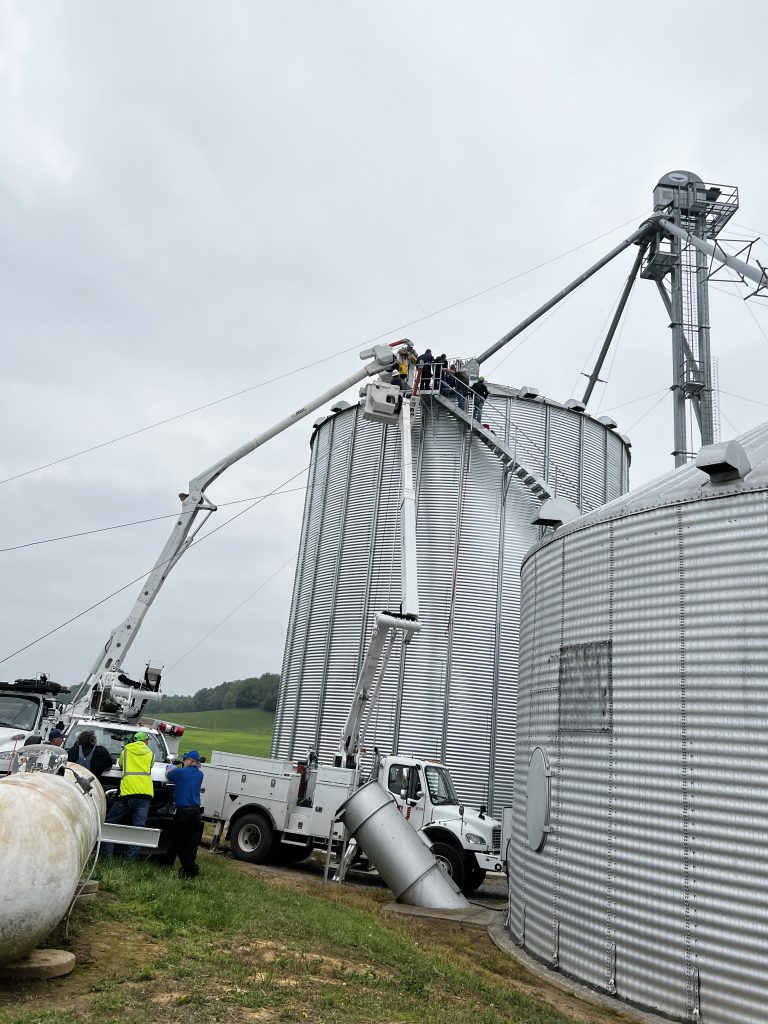
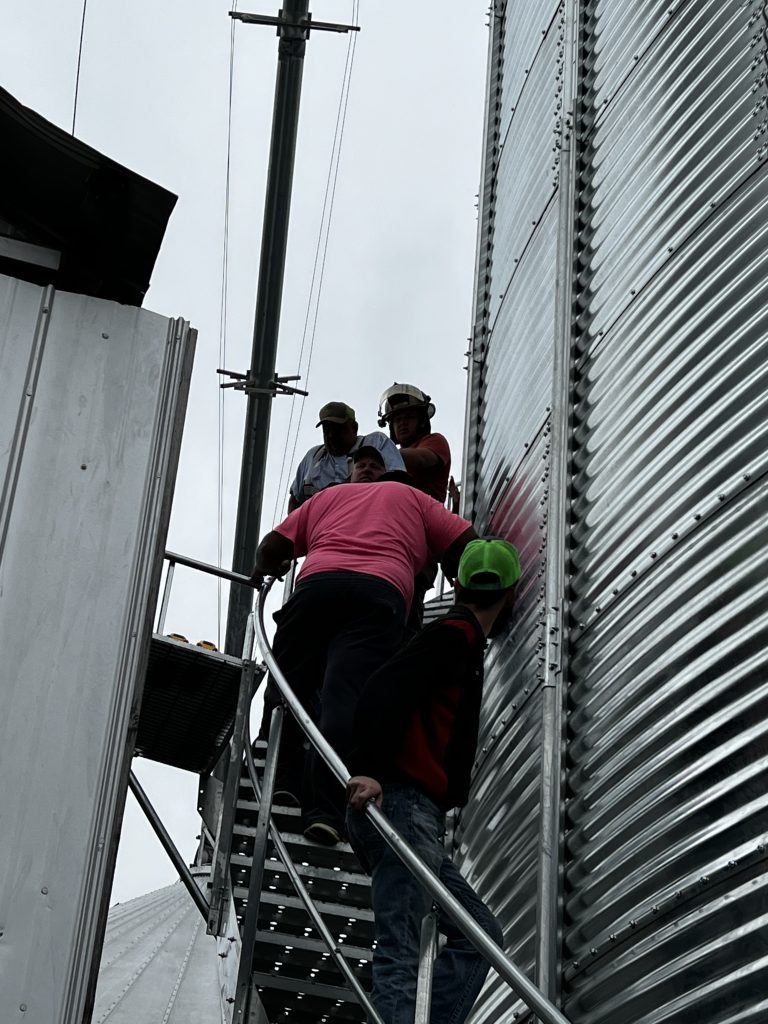
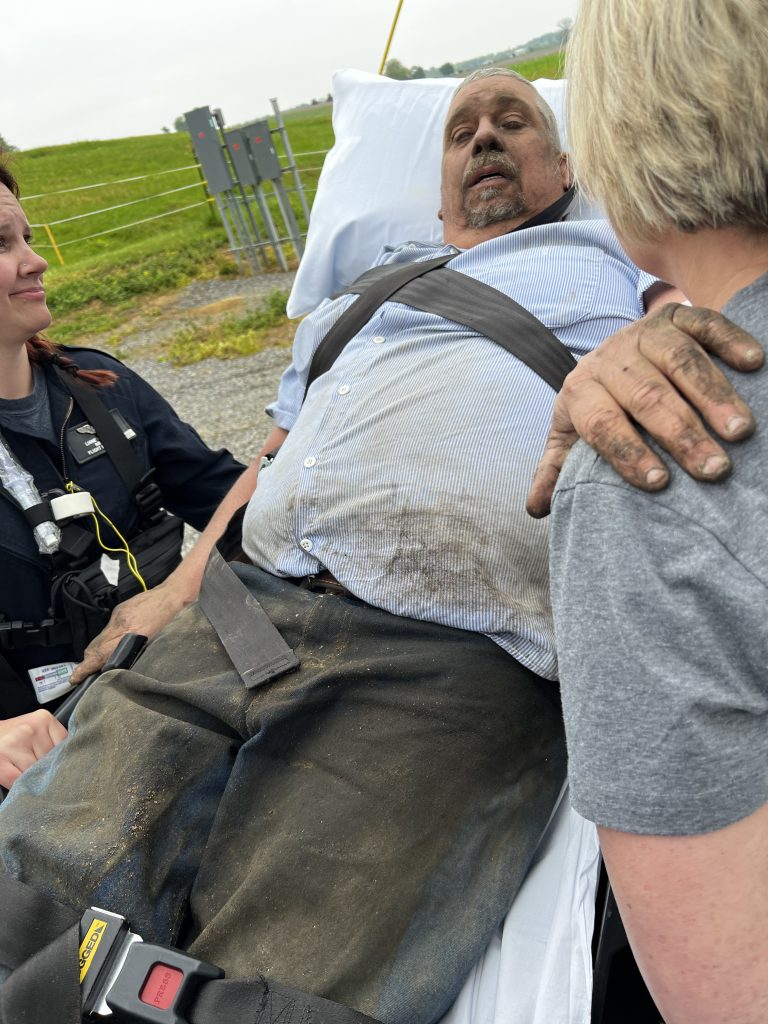
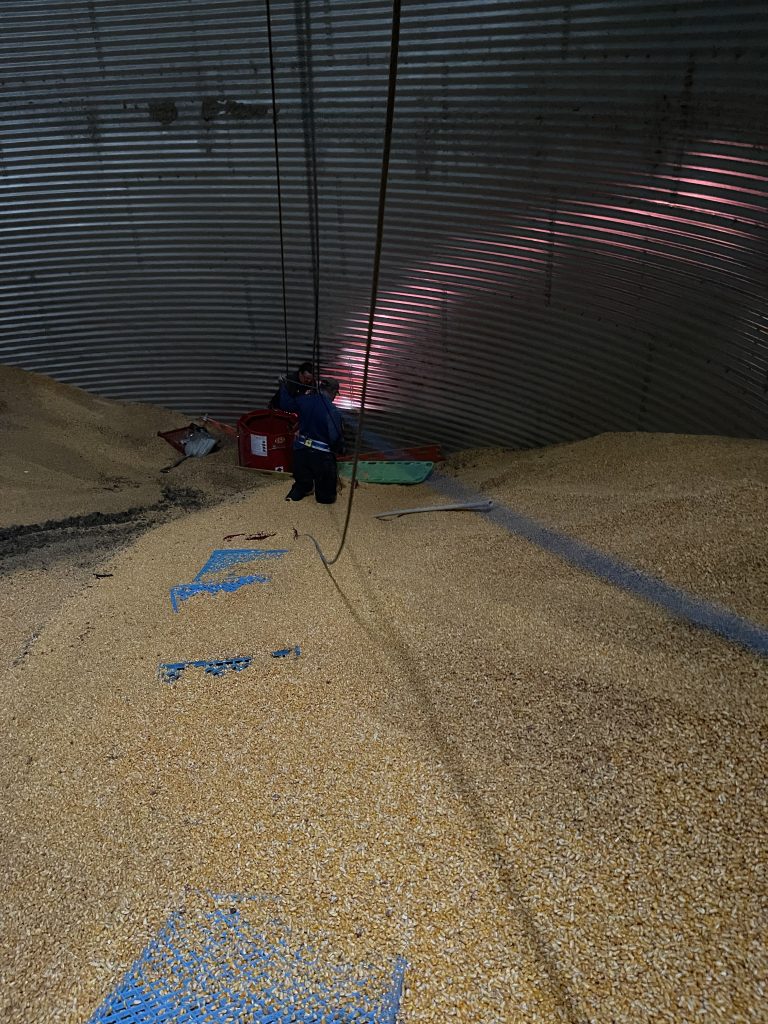
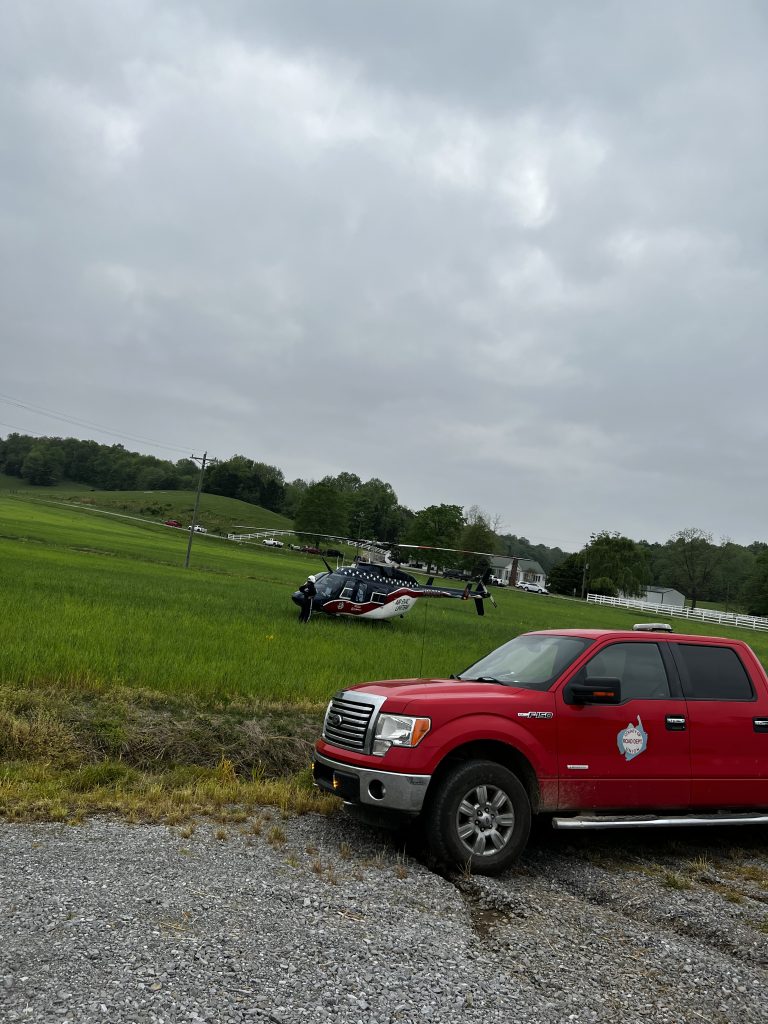
Photos courtesy of Alix Omer.
By Jessica Waltzer
Contact:

Jessica Waltzer
Communications Manager
Jessica@geaps.com
763-999-4306


